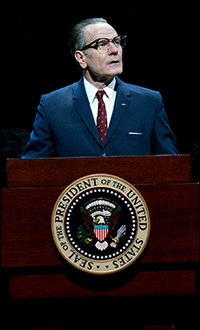
*
Way before he was Walter White on "Breaking Bad" (2008–13), he was Douglas Donovan on "Loving" (1983–85) and spent all those years in New York so focused on his daytime soap that he never had time to notice Broadway or indie films.
"Back then," Bryan Cranston admitted, "I didn't notice real distinctions among soap actors and stage actors and movie actors. We were all just looking for work, right?"
Opportunity is the prime mover of a career, he contended — that, and a bit of good luck. Witness his better-late-than-never Broadway debut, he turns 58 this month, going All The Way with LBJ, the backslapping and backstabbing 36th President of the United States.
"By virtue of my television notoriety, I was in a position to have a selection of offers to come to New York," he said with a certain dirt-kicking modesty. "When I knew my show was winding up about a year and a half ago, I asked my agents to look for a play. I wanted to step away — now, voluntarily — from television and reduce the ubiquitous nature I had, and I thought of no better way than to dive into a great play without having all the fuss around it — where I can just go to work, which is the real joy of it." As luck would have it, Pulitzer Prize winner Robert Schenkkan had written a play about Lyndon Baines Johnson's first year as President, and director Bill Rauch gave it a full production at his Oregon Shakespeare Festival, which had commissioned it.
It was good to go if it passed Cranston's test — and it did. "I'm not seduced by lucrative offers — I'm seduced by the quality and depth of the text," he insisted. "Whenever I consider a project, the story is number one, and number two is the text. They're not always the same. You can have a great story, and somehow the play or screenplay doesn't support it as much as you'd hoped. Other times, the story's not bad, but the script's amazing. Those are the first two things I think of. If they don't pass muster, I say no because it won't be good. The written word will elevate any actor's work. It's the most underappreciated, but most important, element in performance art to me."
Schenkkan, who was brought up in Austin, TX, and whose family knew the Johnsons, confined his drama to LBJ's first 11 months in office when landmark Civil Rights legislation was made. The behind-closed-doors wheeling and dealing that made it happen and the far-reaching effect it had on the country exactly parallel what another Pulitzer Prize winner, Tony Kushner, dramatized in his movie about Lincoln pushing through the Emancipation Proclamation immediately after the Civil War.
 |
||
| Cranston in All the Way. |
||
| Photo by Evgenia Eliseeva |
Cranston rose to this presidency largely through episodic television, from an early spot on CHiPs in 1982 to guest starring on "Walker, Texas Ranger;" "Touched by an Angel;" "The X-Files;" among many others. Recurring roles as Jerry Seinfeld's eccentric dentist, Tim Whatley, on "Seinfeld," and Kevin James's annoying neighbor, Tim Sacksky, on "The King of Queens," led to a regular gig as a sitcom dad, Hal, the manic man of the house on "Malcolm in the Middle." Then came his signature role — anti-Christ version of all that — "Breaking Bad'"s chemistry teacher-turned-murderous drug lord Walter White.
There were movies along the way — good ones: "Little Miss Sunshine," "Saving Private Ryan," "Drive," "Contagion," "Argo" and others — and fewer stage turns, but he counts them all. "Growing up, most actors find theatre is the only place you get a chance to act," he said. "But there's a pragmatic aspect to the career of acting. If someone offers you a job, take it. Others might get more opportunities in theatre and get more entrenched in that."
It's all about listening to the knock of opportunity.
In the midst of his Broadway presidency, Cranston will hit movie theatres in "Godzilla." "I play the title character," he quipped. In truth, he's a scientist at the plant where all hell is breaking loose — light years from "Breaking Bad," you must be thinking — but not really: "At first, I turned it down. Then my agents, who know I'm about the writing of it, told me to read it again. I did, and discovered it's not what I first thought. This is a character-driven monster movie. That's neat."






































